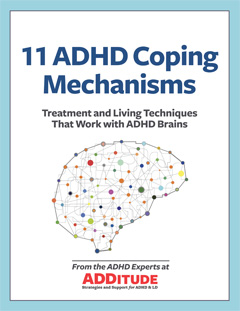You may have once thought that your loved one with ADHD either had a motivational problem, a behavioral problem, a moral failing that he or she could readily change, or was willfully making bad lifestyle choices.
Maybe you believed he could just change if he wanted to. Maybe you withheld your compassion for his plight because, somehow, he deserved what was happening to him since he “chose” to behave impulsively, emotionally, and inattentively. Maybe you even criticized your loved one for deciding to be “that way,” viewing his actions as intentional misbehavior and irresponsibility.
Hopefully, you know now that none of those assumptions is true. That change of perspective usually brings with it a deeper understanding of what may be going wrong with your spouse or son or daughter. My hope is that it has led you to have greater compassion for your loved one’s plight and a greater willingness to assist him in managing this chronic disability.
Here are some of the ways you can help your loved one with adult ADHD.
1. Be an acceptor and a good listener. In various follow-up studies (including my own) of children with ADHD into adulthood, researchers working independently of each other discovered something: Adults with ADHD who felt they were doing pretty well always had someone who accepted them for who and what they were. That someone never abandoned them in times of trouble, and listened to them when they needed to talk about their problems. This was the person they always trusted to be there for them. Even if it was just to listen and relate to them in nonjudgmental ways, it was a valuable role, nonetheless.
Being nonjudgmental does not mean you deny or make excuses for your loved one’s inappropriate behavior or its consequences. You can be a good listener and acceptor while still openly acknowledging the facts of a situation. You can be constructively critical without being morally judgmental.
2.?Be a support team member. Adults with ADHD don’t just need professionals to diagnose, treat, and support them through the difficulties they experience in trying to change themselves and their lives for the better. They also need people who understand they are struggling to cope with a neurodevelopmental disability and who show some compassion for their struggles. That compassion should be expressed even if your loved one’s attempts to change are not always successful. This person encourages him and actively assists him throughout the change process. Like a birthing coach or midwife, the role involves assisting your loved one through a passage to a new and better life. If you are so inclined, you can help him with the changes he is trying to make. You don’t just “get it” about adult ADHD, you help him to “fix it.”
3.?Become an advocate. Sometimes your loved one may need help in explaining what ADHD is to others in and outside of your family. Or he could use your assistance in defending against the callous or ignorant opinions of others. Your loved one could also use your help in encouraging others to accept and to make accommodations for her. At times, when relatives, friends, or social acquaintances make insensitive or critical statements about your loved one, you can help change their minds. They may not understand the nature of the disorder. If so, you can diplomatically correct their misunderstanding. You can even suggest resources they can pursue to learn more about adult ADHD.
Your job as an advocate is not to bite someone’s head off in defense of your loved one when someone has spoken ill of him. Instead, your role here is that of a teacher, liaison, or diplomat who clarifies the true nature of your loved one’s ADHD symptoms. Again, don’t make excuses, deny, or cover up the wrongdoings of your loved one and the adverse consequences of his actions. But you can help others to understand what role ADHD may have played in such misconduct and mistakes.
The role of advocate can be played with people at government agencies, schools, or other organizations your loved one must deal with. Just being with her when she is trying to negotiate these bureaucracies can be of great help.
4.?Become a benefactor. This is not a role most relatives, partners, or close friends can play. It involves having the financial resources to be able to help pay for constructive things your loved one wishes to do. Assuming this role can mean paying for professional evaluations and treatments, school tuition and books, or hiring him in a summer or part-time capacity if you have your own business. Being a benefactor may mean that you help to get your loved one preventive medical and dental care checkups, or cover the copays if she has insurance but can’t afford them. This was one way I chose to help out my brother and nephew, who both had ADHD.
Notice that all of these things support constructive activities that offer a chance for improving your loved one’s life. Money won’t fix everything; problems can still occur. But what your financial support can do it to open doors of opportunity for self-improvement. And that, as they say, is priceless.
Adapted with permission from BARKLEY, R.A. (2017). ROLES you can adopt to be of help. In R.A. Barkley, When an Adult You Love Has ADHD: Professional Advice for Parents, Partners, and Siblings (pp. 293-306). http://dx.doi.org/10.1037/15963-015. Copyright © 2017 American Psychological Association. Any further use requires written permission from the American Psychological Association.





